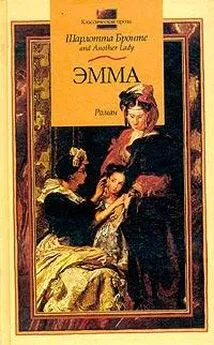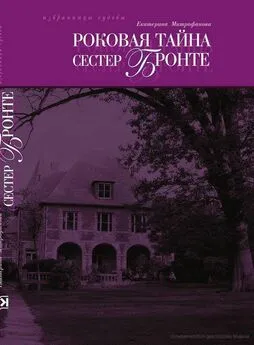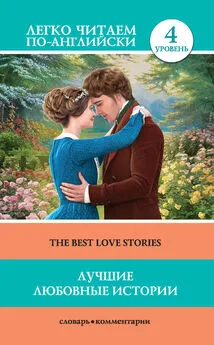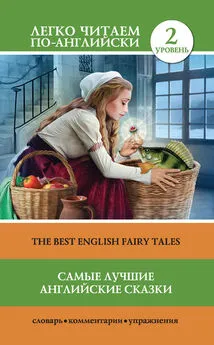Шарлотта Бронте - Лучшие романы сестер Бронте / The best of the Brontë sisters
- Название:Лучшие романы сестер Бронте / The best of the Brontë sisters
- Автор:
- Жанр:
- Издательство:Литагент «Эксмо»334eb225-f845-102a-9d2a-1f07c3bd69d8
- Год:2013
- Город:Москва
- ISBN:978-5-699-61892-7
- Рейтинг:
- Избранное:Добавить в избранное
-
Отзывы:
-
Ваша оценка:
Шарлотта Бронте - Лучшие романы сестер Бронте / The best of the Brontë sisters краткое содержание
«Иностранный язык: учимся у классиков» – это только оригинальные тексты лучших произведений мировой литературы. Эти книги станут эффективным и увлекательным пособием для изучающих иностранный язык на хорошем «продолжающем» и «продвинутом» уровне. Они помогут эффективно расширить словарный запас, подскажут, где и как правильно употреблять устойчивые выражения и грамматические конструкции, просто подарят радость от чтения. В конце книги дана краткая информация о культуроведческих, страноведческих, исторических и географических реалиях описываемого периода, которая поможет лучше ориентироваться в тексте произведения.
Серия «Иностранный язык: учимся у классиков» адресована широкому кругу читателей, хорошо владеющих английским языком и стремящихся к его совершенствованию.
Лучшие романы сестер Бронте / The best of the Brontë sisters - читать онлайн бесплатно ознакомительный отрывок
Интервал:
Закладка:
‘Tell me,’ said she, availing herself of the first pause in the attempted conversation between her aunt and me, and speaking fast and low, with her eyes bent on the gold chain – for I now ventured another glance – ‘Tell me how you all are at Linden-hope – has nothing happened since I left you?’
‘I believe not.’
‘Nobody dead? nobody married?’
‘No.’
‘Or – or expecting to marry? – No old ties dissolved or new ones formed? no old friends forgotten or supplanted?’
She dropped her voice so low in the last sentence that no one could have caught the concluding words but myself, and at the same time turned her eyes upon me with a dawning smile, most sweetly melancholy, and a look of timid though keen inquiry that made my cheeks tingle with inexpressible emotions.
‘I believe not,’ I answered. ‘Certainly not, if others are as little changed as I.’ Her face glowed in sympathy with mine.
‘And you really did not mean to call?’ she exclaimed.
‘I feared to intrude.’
‘To intrude!’ cried she, with an impatient gesture. ‘What – ’ but as if suddenly recollecting her aunt’s presence, she checked herself, and, turning to that lady, continued – ‘Why, aunt, this man is my brother’s close friend, and was my own intimate acquaintance (for a few short months at least), and professed a great attachment to my boy – and when he passes the house, so many scores of miles from his home, he declines to look in for fear of intruding!’
‘Mr. Markham is over-modest,’ observed Mrs. Maxwell.
‘Over-ceremonious rather,’ said her niece – ‘over – well, it’s no matter.’ And turning from me, she seated herself in a chair beside the table, and pulling a book to her by the cover, began to turn over the leaves in an energetic kind of abstraction.
‘If I had known,’ said I, ‘that you would have honoured me by remembering me as an intimate acquaintance, I most likely should not have denied myself the pleasure of calling upon you, but I thought you had forgotten me long ago.’
‘You judged of others by yourself,’ muttered she without raising her eyes from the book, but reddening as she spoke, and hastily turning over a dozen leaves at once.
There was a pause, of which Arthur thought he might venture to avail himself to introduce his handsome young setter, and show me how wonderfully it was grown and improved, and to ask after the welfare of its father Sancho. Mrs. Maxwell then withdrew to take off her things. Helen immediately pushed the book from her, and after silently surveying her son, his friend, and his dog for a few moments, she dismissed the former from the room under pretence of wishing him to fetch his last new book to show me. The child obeyed with alacrity; but I continued caressing the dog. The silence might have lasted till its master’s return, had it depended on me to break it; but, in half a minute or less, my hostess impatiently rose, and, taking her former station on the rug between me and the chimney corner, earnestly exclaimed –
‘Gilbert, what is the matter with you? – why are you so changed? It is a very indiscreet question, I know,’ she hastened to add: ‘perhaps a very rude one – don’t answer it if you think so – but I hate mysteries and concealments.’
‘I am not changed, Helen – unfortunately I am as keen and passionate as ever – it is not I, it is circumstances that are changed.’
‘What circumstances? Do tell me!’ Her cheek was blanched with the very anguish of anxiety – could it be with the fear that I had rashly pledged my faith to another?
‘I’ll tell you at once,’ said I. ‘I will confess that I came here for the purpose of seeing you (not without some monitory misgivings at my own presumption, and fears that I should be as little welcome as expected when I came), but I did not know that this estate was yours until enlightened on the subject of your inheritance by the conversation of two fellow-passengers in the last stage of my journey; and then I saw at once the folly of the hopes I had cherished, and the madness of retaining them a moment longer; and though I alighted at your gates, I determined not to enter within them; I lingered a few minutes to see the place, but was fully resolved to return to M– without seeing its mistress.’
‘And if my aunt and I had not been just returning from our morning drive, I should have seen and heard no more of you?’
‘I thought it would be better for both that we should not meet,’ replied I, as calmly as I could, but not daring to speak above my breath, from conscious inability to steady my voice, and not daring to look in her face lest my firmness should forsake me altogether. ‘I thought an interview would only disturb your peace and madden me. But I am glad, now, of this opportunity of seeing you once more and knowing that you have not forgotten me, and of assuring you that I shall never cease to remember you.’
There was a moment’s pause. Mrs. Huntingdon moved away, and stood in the recess of the window. Did she regard this as an intimation that modesty alone prevented me from asking her hand? and was she considering how to repulse me with the smallest injury to my feelings? Before I could speak to relieve her from such a perplexity, she broke the silence herself by suddenly turning towards me and observing –
‘You might have had such an opportunity before – as far, I mean, as regards assuring me of your kindly recollections, and yourself of mine, if you had written to me.’
‘I would have done so, but I did not know your address, and did not like to ask your brother, because I thought he would object to my writing; but this would not have deterred me for a moment, if I could have ventured to believe that you expected to hear from me, or even wasted a thought upon your unhappy friend; but your silence naturally led me to conclude myself forgotten.’
‘Did you expect me to write to you, then?’
‘No, Helen – Mrs. Huntingdon,’ said I, blushing at the implied imputation, ‘certainly not; but if you had sent me a message through your brother, or even asked him about me now and then – ’
‘I did ask about you frequently. I was not going to do more,’ continued she, smiling, ‘so long as you continued to restrict yourself to a few polite inquiries about my health.’
‘Your brother never told me that you had mentioned my name.’
‘Did you ever ask him?’
‘No; for I saw he did not wish to be questioned about you, or to afford the slightest encouragement or assistance to my too obstinate attachment.’ Helen did not reply. ‘And he was perfectly right,’ added I. But she remained in silence, looking out upon the snowy lawn. ‘Oh, I will relieve her of my presence,’ thought I; and immediately I rose and advanced to take leave, with a most heroic resolution – but pride was at the bottom of it, or it could not have carried me through.
‘Are you going already?’ said she, taking the hand I offered, and not immediately letting it go.
‘Why should I stay any longer?’
‘Wait till Arthur comes, at least.’
Only too glad to obey, I stood and leant against the opposite side of the window.
‘You told me you were not changed,’ said my companion: ‘you are – very much so.’
‘No, Mrs. Huntingdon, I only ought to be.’
‘Do you mean to maintain that you have the same regard for me that you had when last we met?’
‘I have; but it would be wrong to talk of it now.’
‘It was wrong to talk of it then, Gilbert; it would not now – unless to do so would be to violate the truth.’
I was too much agitated to speak; but, without waiting for an answer, she turned away her glistening eye and crimson cheek, and threw up the window and looked out, whether to calm her own, excited feelings, or to relieve her embarrassment, or only to pluck that beautiful half-blown Christmas-rose [246]that grew upon the little shrub without, just peeping from the snow that had hitherto, no doubt, defended it from the frost, and was now melting away in the sun. Pluck it, however, she did, and having gently dashed the glittering powder from its leaves, approached it to her lips and said:
‘This rose is not so fragrant as a summer flower, but it has stood through hardships none of them could bear: the cold rain of winter has sufficed to nourish it, and its faint sun to warm it; the bleak winds have not blanched it, or broken its stem, and the keen frost has not blighted it. Look, Gilbert, it is still fresh and blooming as a flower can be, with the cold snow even now on its petals. – Will you have it?’
I held out my hand: I dared not speak lest my emotion should overmaster me. She laid the rose across my palm, but I scarcely closed my fingers upon it, so deeply was I absorbed in thinking what might be the meaning of her words, and what I ought to do or say upon the occasion; whether to give way to my feelings or restrain them still. Misconstruing this hesitation into indifference – or reluctance even – to accept her gift, Helen suddenly snatched it from my hand, threw it out on to the snow, shut down the window with an emphasis, and withdrew to the fire.
‘Helen, what means this?’ I cried, electrified at this startling change in her demeanour.
‘You did not understand my gift,’ said she – ‘or, what is worse, you despised it. I’m sorry I gave it you; but since I did make such a mistake, the only remedy I could think of was to take it away.’
‘You misunderstood me cruelly,’ I replied, and in a minute I had opened the window again, leaped out, picked up the flower, brought it in, and presented it to her, imploring her to give it me again, and I would keep it for ever for her sake, and prize it more highly than anything in the world I possessed.
‘And will this content you?’ said she, as she took it in her hand.
‘It shall,’ I answered.
‘There, then; take it.’
I pressed it earnestly to my lips, and put it in my bosom, Mrs. Huntingdon looking on with a half-sarcastic smile.
‘Now, are you going?’ said she.
‘I will if – if I must.’
‘You are changed,’ persisted she – ‘you are grown either very proud or very indifferent.’
‘I am neither, Helen – Mrs. Huntingdon. If you could see my heart –’
‘You must be one, – if not both. And why Mrs. Huntingdon? – why not Helen, as before?’
‘Helen, then – dear Helen!’ I murmured. I was in an agony of mingled love, hope, delight, uncertainty, and suspense.
‘The rose I gave you was an emblem of my heart,’ said she; ‘would you take it away and leave me here alone?’
‘Would you give me your hand too, if I asked it?’
‘Have I not said enough?’ she answered, with a most enchanting smile. I snatched her hand, and would have fervently kissed it, but suddenly checked myself, and said, –
‘But have you considered the consequences?’
‘Hardly, I think, or I should not have offered myself to one too proud to take me, or too indifferent to make his affection outweigh my worldly goods.’
Stupid blockhead that I was! – I trembled to clasp her in my arms, but dared not believe in so much joy, and yet restrained myself to say, –
‘But if you should repent!’
‘It would be your fault,’ she replied: ‘I never shall, unless you bitterly disappoint me. If you have not sufficient confidence in my affection to believe this, let me alone.’
‘My darling angel – my own Helen,’ cried I, now passionately kissing the hand I still retained, and throwing my left arm around her, ‘you never shall repent, if it depend on me alone. But have you thought of your aunt?’ I trembled for the answer, and clasped her closer to my heart in the instinctive dread of losing my new-found treasure.
Читать дальшеИнтервал:
Закладка:










